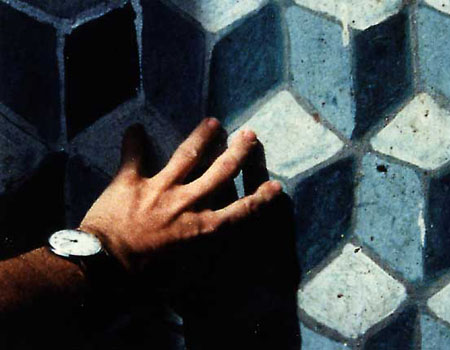On the occasion of this Thursday’s forthcoming screening of Johan van der Keuken’s The Way South, CATE interviewed SAIC Film, Video, and New Media Professor Daniel Eisenberg, who will be introducing the film, and who himself is deeply influenced by van der Keuken’s work.
CATE: Can you tell us a little about The Way South?
Daniel Eisenberg: The Way South is a film that was made in 1980-81, and originally broadcast on Dutch television as three separate pieces which JVDK then reedited into one long film. It’s a remarkable film that speaks to us about contemporary post-modern, post-colonial conditions and political and economic networks long before the term “globalism” ever appeared in critical discourse. Its most important themes, that of exile, dislocation, and displacement, our economic interconnections to communities both near and far, disparities of power and wealth, are all so large and immense that they can only be embraced in the personal essayistic style that JVDK so brilliantly employs.
CATE: The film is part of a series of political works, including van der Keuken’s “North-South Triptych.” How does it relate to the other films in this series, and why is this relationship important?
DE: The point you raise about connecting this work to his others is important. JVDK was a prolific and yet self-critical filmmaker. He was able to engage large themes and at the same time be aware that his work was more about the subjective relation he and his images have to the world. So his oeuvre is marked by continuity as well as discontinuity. Those continuous and discontinuous threads occur both within and between works. Themes are rethought and reconsidered over decades, and traces the progress of his own thinking as well as producing a picture of the world.
CATE: What is your relationship to van der Keuken and his work? How has it inspired you?
DE: I met JVDK in 1988 at a film festival in Mannheim, Germany. It was my first international film festival, and he showed his remarkable film, The Eye Above the Well, about his travels in Kerala, India, which was a new and powerful experience for me.
The film embodied so many of the desires that I had as a filmmaker: to be able to use the camera to “see” critically. To use the camera as a way to open things up, rather than to close things down, as it so often does. To register the self as well as the subject and at the same time to invoke the third body in the equation, the viewer. To invoke deep political and human relations, visually.
I also was gratified that some of the ways Johan used his camera in The Eye Above the Well were echoed in the work I presented at the festival as well, Cooperation of Parts. He felt to me like a kindred spirit. After the screening I wanted to let him know how powerful my experience of the film had been, and mentioned my own work to him. He said he would very much like to see it, and took my contact information. I received a phone call about a year later from Johan letting me know that he had seen a notice for a screening of Cooperation of Parts in NYC while there, and that he would come to the screening, and hopefully we would be able to talk about the work afterwards. Johan was that kind of person…authentic, generous, aware of himself and of others.
He remained generous to me in so many ways over the next decade, as we would often meet at film festivals in France and Germany. I can’t say we were close, but every time we got together it was like being with an old friend, sharing stories and experiences. That he saw himself as a quiet mentor to so many young filmmakers such as myself was simply the way he was, and that humility and generosity fueled an entire generation. You knew that you were in part, making work for Johan, an experienced and demanding filmmaker himself, and in that way you were never alone with your work. And it goes without saying you always learned from his work…
CATE: Why did you want to bring this film to Conversations at the Edge? What do you hope the audience will get out of this screening?
DE: Although well known in Europe, Johan van der Keuken’s work is virtually unseen in the US. The sense of time that is embedded in his work — both the cinematic time of the films themselves, and the historical time of their production — I think that we have lost something of that in the work that’s being produced today. He was the embodiment of a humanist film practice, deeply respectful of the people he filmed and met. That resonates in his work. I want students to see and feel that it’s important to be present in their work, that cinema as an art form is more than a set of formal and conceptual strategies, and beyond that, more than a set of career choices. For cinema to continue to be relevant we need to re-embrace that sense of connectedness, that desire to reach beyond the image. Johan so deftly showed us that was indeed possible.
